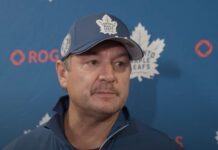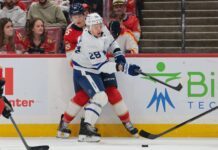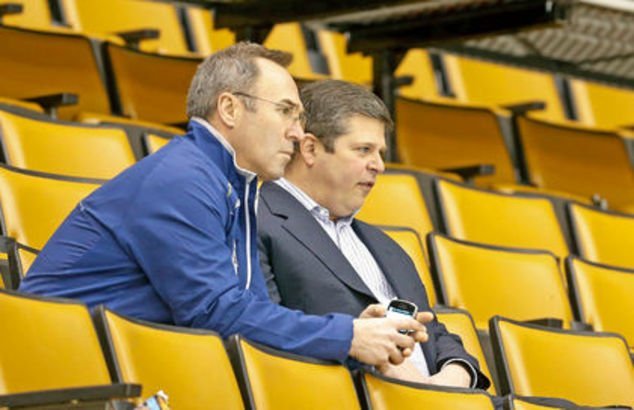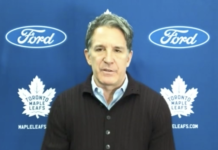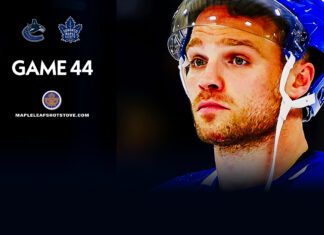MLHS’ Alec Brownscombe chatted with Vice President of Hockey Operations and GM of the Toronto Marlies Dave Poulin earlier this afternoon. The conversation starts with a discussion of Poulin’s role in the organization and touches on the promotion of Chris Dennis to assistant coach, before leading into a discussion of the team’s possession play, team identity, and the off-season moves. The interview wraps up with a few questions about next season’s schedule. Enjoy.
Alec Brownscombe: How’s the summer going?
Dave Poulin: It’s pretty continuous right now in the summer, because you go from the season, into the draft, into free agency, and I’m very involved with the Marlies as well and those meetings. You just continue restocking your teams, and you’re talking to agents; it really hasn’t broken. It has a little now, but now I’m jumping back into the amateur side and I’m headed over to the Ivan Hlinka tournament over in Bratislava on Sunday.
AB: Take us through what the VP of Hockey Ops does on a day-to-day basis in terms of your responsibilities and who you oversee.
DP: It’s a little bit of every part. The ultimate goal is building the Toronto Maple Leafs. But within that capacity, and that’s day one and job one, is everything to do with the Maple Leafs and hockey operations, so it’s the logistical things like the budgets, the personnel, dealing with the various staffs: training staff, medical staff, equipment staff and the scouting staff, pro and amateur. So it all kind of funnels through here, the entire operations of running a hockey team from a logistical standpoint, not just who goes on the ice… the logistical, business side of things.
AB: Any difference between working under Dave Nonis compared to how things worked under Brian Burke?
DP: I don’t think a lot has changed. We’ve all known each other a long time, and we all go back a long ways with each other in various capacities. Is it different? The dynamics are different certainly, from Burkie’s personality being here. I don’t think that Claude or I’s jobs have significantly changed. We’re just doing exactly what we did, we’re supporting our boss who is now Dave Nonis rather than Brian Burke.
AB: The team recently promoted Chris Dennis to assistant coach. What was the thinking behind his promotion? In addition to video, does he take care of analytics, as in track player performance via statistical metrics?
DP: He does. He’s very involved in that. His role has grown considerably under Randy’s staff. He will begin now to go on the ice more. Quite frankly, it’s because his role has grown so significantly under Randy [that he was promoted]. So he does his statistical analysis every game; they have a program or system they have set up between he and the assistant coaches, and they do statistical tracking of every game. He’s very responsible for large portions of that.
AB: When management sat down and made their assessments following last season, was their much focus on the team’s possession play? How do you think the team fared in that department? They were certainly outshot, did you feel they were outchanced?
DP: I think scoring chances and shots are two very different things; very different things. A scoring chance is not a shot on net and a shot on net is not a scoring chance. From a standpoint of that, I would be more interested in our goals against than our shots against. In that, we fared pretty well and we were a better defensive team. Time of possession is something that’s interesting as well. The bottom line is wins and losses. That is the bottom line. We were a better team in wins and losses. You can pick apart any statistical reference that you would chose to in terms of “you didn’t do this very well, or you didn’t do that very well.” If you might say that your shots against are too high, there’s a variety of different factors that lead to that. But from a standpoint of possession, you always want to possess the puck more and I feel two of the players we’ve added in in David Bolland and David Clarkson are both down-low puck possession guys. But if we are a good first strike team, and we score goals on the rush, then our time of possession in the offensive zone might not be very high. So which would you rather have? A rush goal, or a time of possession goal? Does a time of possession goal look better because you control the puck more, or is a first-strike goal every bit just as much a goal as a time of possession goal? I think you always want to possess the puck more if it’s possessed in a positive manner; you don’t want to play rope a dope outside and have no scoring chances.
AB: What’s one main area you would like to see the team improve on over 82 games next season?
DP: Our penalty killing was certainly better but our special teams ratio can always be better, so you would look at the powerplay. I’d say continued improvement; I wouldn’t say it’s one area. I think we got better in some areas last year. Naturally everyone is going to focus on an area like puck possession, and certainly we would like to be better there. We would like to give up less shots, but you don’t want to give up less shots at the risk at giving up more scoring chances.
AB: And you feel the team was effective at suppressing shot quality in favour of shot quantity?
DP: Absolutely. We looked at scoring chances and we looked at grade A scoring chances.
AB: What was it about the team’s defensive play that you think produced that result?
DP: There was probably under Randy a recommitment to defense. Obviously we had slightly different personnel in the lineup that matched better. Maybe there was a better commitment to defense on everyone’s part, but we certainly played better in our own end of the rink.
AB: The Leafs had an interesting identity last season. They fought a lot, and finished their checks, but weren’t a team that really grinded team’s down on the cycle, relying more on their speed and rush game and transitional offense. The Leafs had to be among the quickest skating teams in the league and had a lot of skill up front as well.
DP: Yes, that’s a product of the type of personnel we had as well.
AB: Do you see the team’s identity as changed at all going into next season?
DP: I don’t think so. I think we may be a little more difficult to play against because of the additions we’ve made particularly in Bolland and Clarkson. Those are two challenging players to play against on an every night basis. I think both like the down low game, the grinding game, and it fits in well and complements what we have.
AB: When management moves a piece like Frattin as well as a 2nd plus Ben Scrivens to bring in a goalie like Bernier, who wants a shot at being the guy, would fans be wrong to suggest management has assessed Reimer’s play as still less than convincing?
DP: I think they’d be very wrong to say that. We’ve never said that, and we just felt that it was an opportunity to get deeper at the goalie position. It was getting a like-age goalie to Reims and we felt they could grow together and challenge each other for the position, but at no point did anyone in the front office ever say that we weren’t happy with Reims at all.
AB: How much were the managerial decisions of the past off-season based on Randy Carlyle in terms of his player roles, player preference, style of play, and his general hockey philosophy?
DP: I think it’s very much in line with management’s hockey philosophy. I think there’s a lot of communication that goes on between the coach and the management team on an everyday basis. It’s interesting because there’s nothing to say that we may not have wanted to acquire a David Clarkson or a Dave Bolland three years ago, problem was they weren’t necessarily available. You can’t always say that it’s a timely thing in terms of, “why did you do this at this point?”, or “Why did you add a goalie like Bernier at this point?” It’s very possible that had a goalie like Bernier been available two years ago we might have added him. I think something that is very misconstrued is the timing of moves. It isn’t just what you want to do, it’s someone else being available and wanting to do business with you. It’s not just, “go add a top-four defenceman.” Well, that’s fine to say and everybody in the league may be trying to do that, but go find a top-four defenceman that is available, that fits your team, that fits your price range, that someone is willing to deal. The whole essence of my job, of Claude’s job, of David’s job, is the timing of page one; page one being the Toronto Maple Leafs. Can you time the page so that everything lines up at the same time, between your UFAs, your RFAs, your waiver situations, the age group of players that are developing, the contract status of players that are developing? There’s so many different variables, besides the cap going down nine percent, that go into a final product of a hockey team. The timing has to be incredibly efficient on every single front of what I just described. You have to have a like-aged team; it’s no good for us to have a player who fits in good now but isn’t going to be available in three years from now or two years from now. You’re trying to grow a group of players. But, for instance, we could have a player now who is finally very close to making the team but now he could require waivers, forcing him to stay up, whereas in the past you had the luxury of being able to send him to the Marlies.
AB: Would it be fair then to label the Bernier trade as more about asset management, in terms of adding young depth at a key position, than anything about Reimer?
DP: Absolutely. You look down the middle and the toughest positions to acquire are goaltending, top-four defencemen and centermen. The most trade talk goes on with teams desiring those assets.
AB: How do you see the season Grabovski had last year, and the circumstances leading up to his buyout? He took on some tough assignments last season.
DP: He did. He did without question. But we felt as a group that he didn’t fit with what we are doing right now. You look down the middle and you had the continued growth of Nazem Kadri in that position, you had the play of Tyler Bozak, then you had the addition of Dave Bolland and the play of Jay McClement. You’ve essentially got four pieces there that we feel fit what we’re doing and the direction we’re going in, and in that circumstance we didn’t feel Grabo fit.
DP: I think they’ve had looks, but I don’t think the two players fit. It’s interesting because you can look on paper and say, why wouldn’t these two players fit? But the styles wouldn’t necessarily fit.
AB: In terms of sorting out who is the primary puck carrier?
DP: Puck carrying, where a player likes the puck; not just the puck carrying, but where does he want the puck? Does he want the puck going through the neutral zone? Is he willing to give it up early? There are a variety of different factors as to where a player gets the puck and where a player has the puck. I had the opportunity to skate, during the Canada Cup the one year, with arguably the greatest player of all time in Wayne Gretzky. It was such a mismatch style wise. It wasn’t even close. And I had been playing a more offensive role at the time and was in the mid-70 point range a few years in a row, so it wasn’t like I was offensively inept, but I couldn’t think like that, I couldn’t play like that, it just totally didn’t match. It totally didn’t match. They are certain situations both as a player and in management where you get two players and say, “gee, I can’t wait to see these two players together,” and 30 seconds in you’re like, “there’s no chance. There’s absolutely no way.” It’s style of play, and it may not be evident because you think two hockey players can play together, but I can tell you there can be oil and water as easy as there can be two ingredients that go together.
AB: What makes Tyler Bozak a better match for Phil? Bozak finished 41st in scoring among centers. What does he bring to the first line center role that isn’t visible in his numbers?
DP: Rather than even focus on the actual numbers of Tyler Bozak, I’d look at the numbers of Phil Kessel while he’s playing with Tyler Bozak. I believe it’s only three or four players who have scored more goals than him in the last five years in the league. You’ll have to dig that one up to see if that is in fact what the stat is. He’s produced at a high rate, but there’s been so much focus on that [number one center] position. When Tyler, and maybe he continues to grow into a more offensive role, when Tyler came into that position he had a pretty good chemistry with Phil Kessel and whoever has been on the left side has done fairly well themselves. And maybe you don’t look at it so much as your first line centre. If you said, hypothetically, that your first line is going to be JvR – Bozak – Kessel and your second line is going to be Lupul – Kadri – Clarkson, there’s not as much pressure on the first line center spot. I think there’s been an unfair criticism of Tyler Bozak in a role that he’s been put into and has continued to get better at.
AB: Shifting toward the more current issues of the off-season, is management confident it can get all of Fraser, Kadri and Franson under contract with the cap space remaining? Will there have to be a move to open the space?
DP: We’re certainly hopeful we can get it done. We’ll know more after we go through the arbitration process with Mark Fraser and then we’ll deal with what we’ve got from there, but we’re certainly hopeful we can get it all done.
AB: I’ve read that there’s a buyout window that opens after an arbitration ruling. Is that the case?
DP: Yes, that is true. Yeah, there is a buyout window, I believe it’s after the final arbitration date. There is an arbitration window that opens up, but it’s not a compliance window. For instance, if you were to get hit with an arbitration settlement that doesn’t fit into your numbers, you do have the right to exercise a buyout of whomever you would chose to on your team at that point. Not the player that you signed, or that you get the arbitration hearing on, it’s anybody else on the team that can be bought out.
AB: How much of a different animal will it be going into next season with different divisions, 32 games against Western Conference opponents, and obviously a longer 82 game grind?
DP: I don’t think it’s significant, I just don’t. I think you just play each game on a game-to-game basis. You look at last year and the team that made the playoffs and the teams that didn’t make it the year before; at the start of last season, you’re saying, “you have to look out for this team because they were really good last year.” Then, those three teams or four teams didn’t even make the playoffs. I think there’s such a switch right now and there can be such a variance in a team from year to year that it is difficult to say if you’ve got a much tougher division this year or a much tougher Conference. You would probably focus on the fact that you have to travel more and who gets to travel less. But you know, it’s pretty hard to argue with Detroit’s success when they were in the Western Conference, and it didn’t seem to hamper them one little bit while having to deal with Western travel and playing in the Western Conference being the only team in the Eastern timezone. It’s hard to say that it’s that much of a factor when you have a team that’s out there that was successful as they were out there; it was more that they had really good teams.
AB: Are there any concerns within the organization about the effects HBO 24/7 and the cameras might have on the players this season?
DP: I’ve talked to guys that have been involved in them. Obviously I played in Philadelphia, and I have talked to people who have been involved from there and from other teams. Everyone says you get used to it. It’s probably more about the individuals involved than it is a blanket statement of how it’s going to affect a team. Maybe it will show some pretty interesting individuals who would’ve been the same if there was a camera on or not. I think a camera always affects the way a person is, I just do. My personal understanding or belief is that if a camera is in the room, some people are going to act differently than others act, so we’ll have to get used to that.


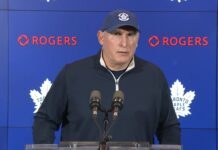
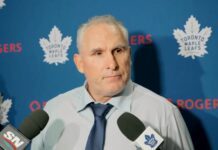


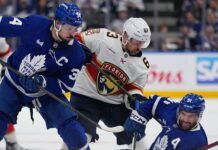




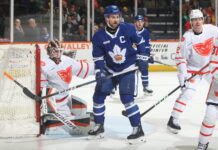


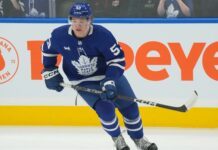
![John Gruden after the Leafs prospects’ 4-1 win over Montreal: “[Vyacheslav Peksa] looked really comfortable in the net… We wouldn’t have won without him” John Gruden, head coach of the Toronto Marlies](https://mapleleafshotstove.com/wp-content/uploads/2025/09/gruden-post-game-sep-14-218x150.jpg)

